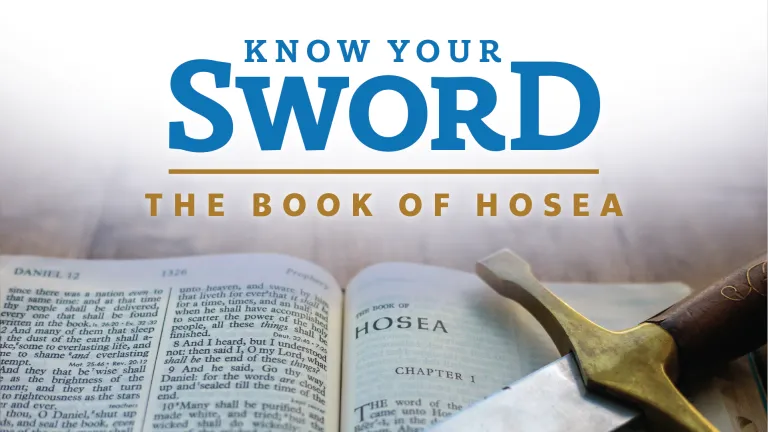Hosea Part 07

God continues warning Israel of impending judgment due to circumstances that sound familiar to our society today . . . God’s pattern of patience and judgment are established as is man’s pattern of disobedience and rebellion. This message is as much for our time as it was for theirs.
In Hosea 9–10, God delivers a sobering message of judgment and loss for Israel’s rebellion. In 9:1–2, He condemns any rejoicing rooted in sinful practices. Some worship rituals included sexual acts on threshing floors, supposedly to bless the harvest. But without God’s blessing, Israel would fall short in food production. Such practices were not only useless but offensive to God.
Verses 3–4 portray sin and captivity. Israel had made offerings that were not to the LORD, so when Assyria invaded, God would not intervene or help. Their religious practices were already corrupted, and now they would cease altogether.
In 9:5–6, the people were no longer keeping God’s feasts and God did not approve of their feasts they were keeping (Isaiah 1:14). Some interpret this as pointing ahead to the “supper” of the Lord described in Revelation 19:17, where birds and beasts feast on the dead bodies of enemies.
False prophets are shown for what they truly were in verses 7-9, although by then the people were already trapped. Hosea references the “days of Gibeah,” a horrifying episode from Judges 19:16–25, when the Benjamites raped a concubine to death. Israel’s response nearly wiped out the entire tribe of Benjamin—a situation so extreme it serves here as a symbol of deep moral collapse.
In 9:10–12, God remembers His “pleasant hopes for Israel” when He first called them. But those hopes were quickly dashed when Israel was seduced at Baal-peor—where Balaam taught the Moabites to lure Israel’s men into fornication and idolatry (Numbers 25:1–5). Idolatry is always called an abomination by God (Deuteronomy 7:25–26; Revelation 17:4–5), and for this, God took away the glory He had once given.
In verses 13–17, one of God’s punishments was reducing Israel’s ability to reproduce—a very serious judgment. In addition, Israel would “wander among nations,” a consequence that extended far beyond the initial captivity. They would no longer be a separate sovereign nation, but mixed in with other nations.
Moving into Hosea 10:1–3, Israel is likened to a vine, similar to Isaiah 5:5, which bore no good fruit. Their prosperity only encouraged more false worship and dissipation. They built many altars to false gods, even though God had commanded just one altar at the temple. They also raised sacred pillars, or Asherah—upright poles or trees, possibly phallic symbols. This resembles trends seen in modern nations today, where material abundance often leads to spiritual decline. As a result, God was taking away their self-rule. With God against them, what could any human king do?
In 10:5–8, the golden calves were to be literally taken to Assyria. Beth Aven—likely a mocking name for Bethel—would face shame. The kemarim, or “black ones” (so-called for the black robes worn by idolatrous priests), would mourn. In their hopelessness, they would call for mountains to fall on them (see Revelation 6:15–17).
Verses 9–10 return again to Gibeah—referring not only to Benjamin’s sin, but also to the over-zealous punishment by the rest of Israel (Judges 19–20). The lesson is that it’s better to let God handle punishment. Hosea mentions two transgressions, likely pointing to both abandoning God and adopting false gods—as in Jeremiah 2:13.
In verse 11, Hosea compares Israel to cattle who enjoyed treading grain (an easy job where they could eat as they worked). But now, God would put a yoke on them and make them plow—doing the hard labor they had tried to avoid. This judgment applied to both Israel and Judah.
Next, a call for change is issued in verses 12-13: stop sowing iniquity and getting its results. Instead, sow righteousness. However, “sow righteousness” is likely not a good translation. It may mean “teach righteousness” or “send righteousness”—possibly a prophecy of God sending Christ. Either way, the message is clear: you reap what you sow.
Finally, in verse 14, Shalman—likely short for Shalmaneser—is referenced, a king of Assyria. By the end, the king of Israel is cut off. Hoshea, the last king of the northern ten tribes, would fall, and with him, the kingdom itself.
It takes some effort to consider how the patterns align with circumstances today, yet the effort will be rewarded with insight and clarity regarding the current state of man’s condition, and how God views the disobedience and rebellion so evident around us.
UYA Team | uya@ucg.org
United Young Adults (UYA) primarily serves the 18–32-year age group for the United Church of God. There are three main areas of contribution to the lives of the young adults: Promoting Spiritual Growth, Developing Meaningful Relationships and Making the Most of Your Talents. The Know Your Sword series is a daily expository message introducing God’s Word from a trusted perspective.

